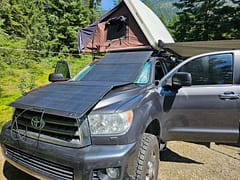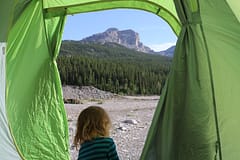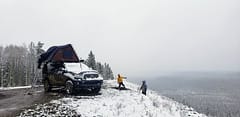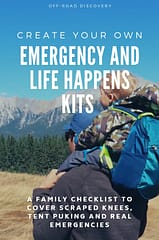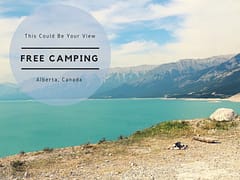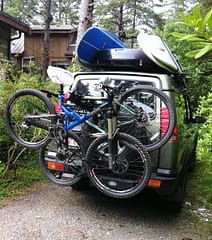Explore Canada’s Backcountry Wilderness
Get off the beaten path, explore the outdoors through backcountry huts
Contents
- Introduction
- Huts Are Great For:
- Hut Types and Resources
- Why You Will Want to Visit Backcountry Huts:
Introduction
We frequently meet people that are wanting to start overnight backcountry trips and everyone immediately correlates overnight trips with camping. Backcountry camping provides freedom and unlimited possibilities, but also requires gear, experience and possibly a companion to have a safe and enjoyable experience. When I talk to these eager adventurers our conversations always end up on sharing a new idea on how to explore the backcountry and I’ve been surprised how few people even know about this option - I’m talking about huts. If people are aware of huts they often haven’t gone because they don’t know what to expect. To answer all of your hut questions here is who should go, where to go, what to expect, what to bring and why you will want to go!
Explore Canada’s Wilderness Through Beautiful Backcountry Huts
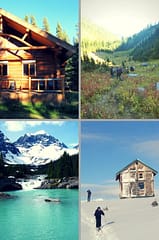
Huts Are Great For:
- Travelers: when traveling to another country or even province you often don’t have all your camping gear, huts allow less gear to experience the outdoors during your travels
- Don’t want to carry heavy backcountry camping gear: not everyone is capable or interested in carrying in a heavy overnight bag. This could include families that need to carry kids or other people’s gear. Ditch the tent and kitchen gear at home.
- Not ready to financially invest: if you are starting out and unsure if you will like backcountry camping, try a hut before financially investing in a ton of gear. Rent what you need for a hut trip.
- Enjoy shared accommodations: many people are solo or enjoy meeting others on the trail. Some huts offer shared accommodations allowing people to not have to be solo and to be in a group vibe.
- Private accommodations: some huts can only be book by full hut not sleeping space. Many of these private accommodations allow dogs.
- Fully catered and guided experience: there is a wide range of backcountry huts that offer more of a hotel experience. Some more extreme locations require a helicopter or guided hike to get to. These places often have private bedrooms, a cook and cleaner.
- Everyone that loves adventure: There are backcountry hut options from the rugged self-guided to the catered hosted experience. We know a 71 year old hiking into rugged huts and families enjoying lodges, there is something for everyone.
Hut Types and Resources
There are a lot of backcountry huts available, some open all year, other seasonal only user for either hiking or skiing season. I’ll start with the most rugged to most luxurious huts.
Self Guided Backcountry Huts
I call these huts self guided since you are responsible for your trip, food and clean-up. There are two types of self-guided backcountry huts available - communal and private.
Communal Style Hut
Communal/shared huts are where you pay to use the facilities for 1+ nights, potentially with other people at the same time. Everything is shared from sleeping area to eating. There is usually one room or loft for sleeping, a kitchen and sitting area. Facilities are usually only outhouses and water will need to be hiked in or sourced from a river or snow. Dogs are not allowed, understandably since these are small shared spaces. The huts are open registration and closed only once all spots are filled. We have been to communal huts and been the only people, but we have also been with several other parties. I recommend ear plugs for sleeping, toilet paper, headlamp for night time reading or card games and a flask of something delicious to make new friends.
Examples of Communal Style Huts:
Private/Non-communal Huts
Privately rented huts can be found through smaller associations. These associations only offer renting the whole hut per-night no matter how many people can fit in them - you will not end up sharing accommodation. These huts often allow dogs since you are not sharing a space. Research any locations you are interested in going there may be a small association around that has huts to rent. These huts tend to be the most rugged as they don’t tend to have the same money to maintain and volunteer base to pull from.
Examples for Privately Rented Huts:
Columbia Valley Hut Association
Backcountry Lodges of British Columbia
There are more options for huts in Canada, Google for Backcountry Huts in Canada and lots of search results come up. This is just a place to start, some of the links provided have both communal and non-communal options, check out each description.
What to Expect while visiting a Backcountry Hut:
Some backcountry hut associations have an annual membership which may offer extra perks than just the use of their huts. Membership required or not you will still have to pay a nightly fee either as an individual for communal huts or per night for the non-communal huts. Communal huts usually cost around $30 per person a night, non-communal may cost $60 for the whole hut a night. You might be thinking wow big price difference, but there is often for a reason. Prices may be different depending on the hut. You must pay in order to get the key code for the hut door and if you just show up without a reservation expect other guests or a hut custodian to kick you out. From our experience, you usually get what you pay for. Lower costing huts don’t come with custodians, chopped firewood, well maintained equipment and shelter. Remember you can book out a whole communal hut you just need to pay for it or have a large enough group. Shared huts can be a very fun experience though - don’t let the idea of sharing with strangers stop you.
Communal Hut Examples
Alpine Club of Canada, Elks Lake Cabin
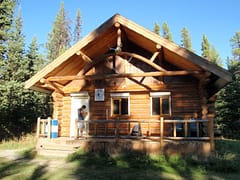
Alpine Club of Canada, Bow Hut Kitchen
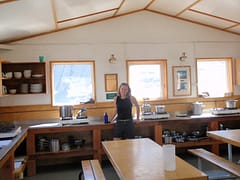
Alpine Club of Canada, Bow Hut Sleeping Area
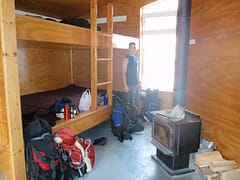
Alpine Club of Canada, Asulkin Hut Eating Area
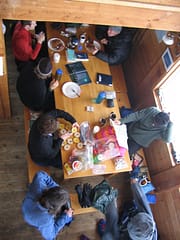
Non-Communal Hut Example
Thunder Meadows, Fernie, British Columbia
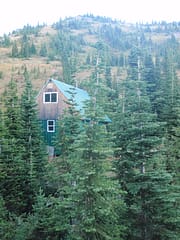
Inside Thunder Meadows, Fernie, British Columbia
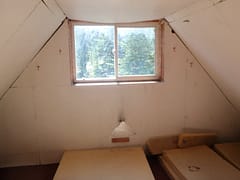
Jumbo Hut is a few Steps Up! We Love Jumbo
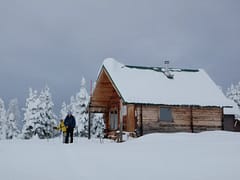
Jumbo Hut Has Single Beds and a Loft, Rugged But Comfortable
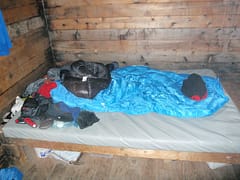
What Huts Have and What to Bring
Backcountry huts are usually located a lengthy hike within the backcountry, are equipped with kitchen pots, pans, utensils, sleeping mats, chopped firewood, propane for lights and stove tops and outhouses. You are required to bring food, sleeping bags and other backcountry essentials such as matches, flashlight, clothing, and potentially water tabs or drinkable water. Each hut listing describes the location. Ear plugs always come handy in huts! You are paying for the upkeep of the hut and trail but still required to clean up after yourself. All huts we’ve been to are located in stunningly beautiful wilderness.
Hut Water Situation Can Vary, Grabbing Easily Accessible Water to Boil From a Stream Outside Elk Lakes Cabin
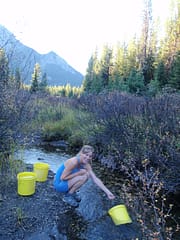
Grabbing Water from the ‘Lake’ at Thunder Meadows Hut
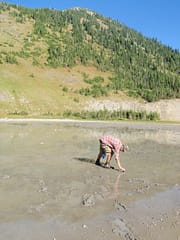
Outhouses Are Your Only Option, Deal With It
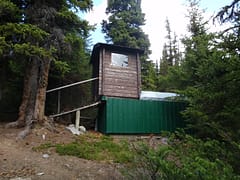
The Views, Hikes and Skiing From Backcountry Huts is Like a Dream
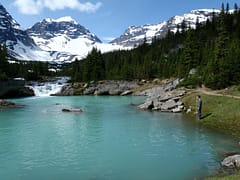
Full-Service Huts / Lodges
Full-service lodges offer more of a hotel-like experience than other huts and there is nothing wrong with that! We want to encourage people to have backcountry adventures as so much positive comes from getting out into the wilderness from personal health and wellness benefits to understanding the need to protect natural spaces from a respect for mother nature. Full-service lodges are beautifully situated, many are well priced and you can ski or hike all day then come back to a hot meal and cold beer. Some locations cost more and may require a helicopter to access but if you have the money why not?! Some of these lodges are shared accommodations but you usually have your own sleeping quarters. Guides are likely available or required for hiking or skiing adventures and cooks will serve you up something delicious.
Examples of Full Service Lodges:
Backcountry Magazine has a great list of huts, lodges and yurts across North America
Why You Will Want to Visit Backcountry Huts:
- Safe, warm, comfortable structures to stay in overnight
- Less equipment needed then overnight camping
- Off the beaten path locations, expect peacefulness
- Beautiful locations!!!
Don’t Miss Views Like This, Above the Sydney Vallance (Fryatt) ACC Hut, Jasper
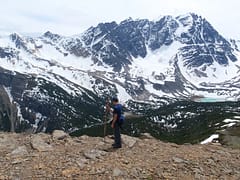
Your backcountry overnight adventures are waiting!
